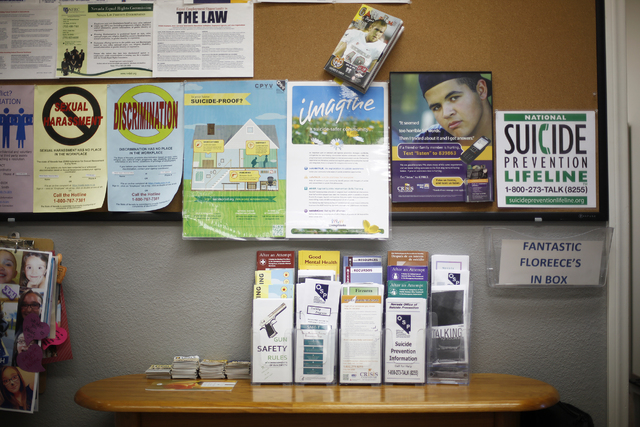
If a loved one is suffering from suicidal thoughts, one of the first things to do is remove guns from the home.
But in states across the U.S., universal background check laws – like the one that just passed in Nevada – and restrictions on temporary gun transfers can be an obstacle to getting guns out.
A November report from the Johns Hopkins Center for Gun Policy and Research examined universal background check laws around the U.S. to see how they measure up in terms of suicide prevention.
ROOM FOR IMPROVEMENT
The report’s lead authors, public health lawyers John Vernick and Alex McCourt, said they believe in universal background check laws, but they wanted to help make them better by drawing attention to this important issue.
Today there are 18 states, plus Washington D.C., that require background checks for private-party sales or transfers.
“We are very pleased, from a public health standpoint, that Nevada is becoming the 19th state,” Vernick said. “We would hate for this issue to be considered an obstacle to enacting background checks.”
The authors said they began looking into suicide issues after hearing from health care workers who were confused about the laws.
“Clinicians, at least sometimes, weren’t sure what they could recommend,” Vernick said. “They weren’t sure what the law required.”
Only 11 states include provisions in their background check requirements that make it easier to get guns away from people who pose a threat to themselves.
The most common, found in nine states, is an exception for firearm transfers between family members.
In Colorado – one of the states featured heavily in the report — universal background check laws do include exceptions for immediate family members. Colorado law allows for a temporary, 72-hour gun transfer.
Unfortunately, the report said, suicide threats can last for weeks or even months.
Nevada’s new universal background check law also includes an exception for family members.
“It’s better than a lot,” Vernick said of the Nevada law. “It still doesn’t have details that we think are necessary.”
One such detail is determining a finite time period for what constitutes a temporary transfer.
The authors said there is a balancing act between crafting an effective law and including the right exceptions. You don’t want the exceptions to swallow the rule, Vernick said.
Nevada’s new law also includes an exception allowing for a temporary transfer to prevent “imminent death or great bodily harm,” but the authors said similar language used in other states refers to armed self-defense rather than suicide.
“We didn’t find any state that does it just right,” McCourt said.
SUICIDE IN NEVADA
A Nevadan took his or her life every 15 hours in 2014, according to the American Foundation for Suicide Prevention. From 1990 through 2014, there were 10,803 suicide deaths in Nevada – an average of 432 each year. Suicide was the second leading cause of death for people ages 15 to 34, and the third for children ages 10 to 14.
The foundation said more than three times as many people in the state die from suicide than homicide. And the leading cause of death in suicides? Firearms.
A 2014 fact sheet from the American Association of Suicidology said firearm suicides made up 50 percent of the nation’s 42,773 self-inflicted deaths that year. In Nevada, firearms are used in suicides on average 57 percent of the time.
Since 1999, Nevada has made significant strides in combating suicides, according to Richard Egan of the state office of suicide prevention.
Egan said he’s waiting for guidance on the new law to see if he’ll need to update the recommendations his office makes, but as it stands now, restricting a suicidal person’s access to lethal means — knives, medications, guns — is a commandment. Especially guns.
“With a firearm there is no chance to intervene,” he said. That’s compared to other means where medical interventions are more feasible.
If a loved one has exhibited a dramatic change in behavior such as depression, violence or substance abuse or is going through an emotional crisis — after a divorce or the loss of a job, for example — getting firearms out of the home is still considered a best practice that could save a life.
Egan said it’s important that community members educate themselves about suicide risks and warning signs and breaks down the taboo against talking about suicide.
“There’s tons and tons of resources,” he said.
Visit suicideprevention.nv.gov for more information about suicide prevention. If you or a loved one needs help now, call the National Suicide Prevention Lifeline anytime at 1-800-273-8255.
Contact Wesley Juhl at wjuhl@reviewjournal.com. Follow @WesJuhl on Twitter.